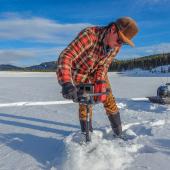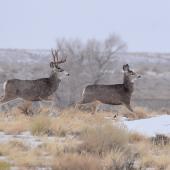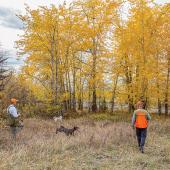Backcountry First Aid
It’s happened a countless number of times. Two guys will head past the north boundary of Bridger Bowl to Hardscrabble, anxious to do some backcountry skiing. Wanting to ski light, they leave everything but a beacon and a shovel behind, thinking those items cover the basics. One guy falls and fractures a leg, leaving the other one helpless in the wilderness with a crippled partner.
"Accidents happen all the time," says Scott Gill, a member of the Winter Backcountry and Alpine Rescue team who also works as a physician’s assistant. "We see accidents that result from every sport—people get hurt when they’re skiing steep hills or just walking in the woods."
"The main thing people can do to prevent an accident from becoming worse is to be prepared for the situation," he adds. "Be ready for the unexpected."
It’s figuring out what the unexpected variables are that make backcountry first aid so tricky. Sports enthusiasts of any kind should know that an element of danger always exists.
"People assume that if everyone knew more about the backcountry, accidents wouldn’t happen," explains Dr. Michael Wise, a physician at Urgent Care in Bozeman. "But that’s not true; accidents happen to everybody. The most crucial time in handling an injury is prior to the time that injury occurs."
Before you head out to fish an icy stream, ski through the Tobacco Roots, or snowmobile through Yellowstone, make sure you understand the basics of preventing injury. Be equipped to handle a situation if you or someone you’re with happens to get hurt.
"I advise people to be smart when they’re out in the woods," notes Wise. "But we see people all the time who have go snowmobiling when they’re drunk. They run into a tree and sustain injuries; then things get worse because they aren’t sober."
Making smart choices before an accident occurs is important even if you aren’t in the backcountry. At Bridger Bowl, where ski patrollers have easy access to first-aid kits and toboggans to transport injured patients, medical personnel are seeing an increase in preventable accidents.
"We see about 700 injuries per season," says Fay Johnson, ski patrol director for Bridger Bowl. "We’re noticing an increase in accidents at the more advanced levels when people ski way too fast or try to jump off cliffs. Inexperienced people try to emulate the extreme trend in sports that we see in magazines and on TV, and they take on things they’re not ready for."
Most athletes know the things you’re supposed to do to prevent an accident: go with someone whose ability and common sense you trust, stay within your limits, carry a basic first-aid kit. But what do you do when an injury occurs?
For anyone who spends time outdoors, it’s smart to be prepared by taking a safety course designed for the backcountry, such as the Wilderness First Response. You’ll learn the basics necessary to minimize the risk to yourself and the people you’re with.
Take a first-aid kit for any trek into the woods, no matter the length. Have splinting materials, bandages and antibiotic ointment. If an accident happens, check the injury and the surrounding areas to assess the damage. Muscle strains, sprains, and fractures are common in the outdoors. Never underestimate an injury.
"The worst thing you can do is try to hike out of the woods on a broken leg," advised Wise. "That’s an easy way to make a moderately severe situation a whole lot worse. People put themselves at the risk of hypothermia and further injury when they don’t understand what’s going on with their bodies.”
People who love the outdoors appreciate the backcountry because it gives them a chance to explore and get away from the crowds on the slopes or in the easy-access spots on the river. But the advantage of being miles away also brings the danger of not having people around to respond. With a little preparation and the knowledge of injury control, time in the backcountry can be fun and safe.
"If you get hurt on a slope at Bridger, there will be crowds around you within seconds and medical personnel with a toboggan ready to take care of you," Wise said. "But if you’re miles from nowhere in Yellowstone and get injured, you’ll be in a world of hurt unless you’ve made a plan."









